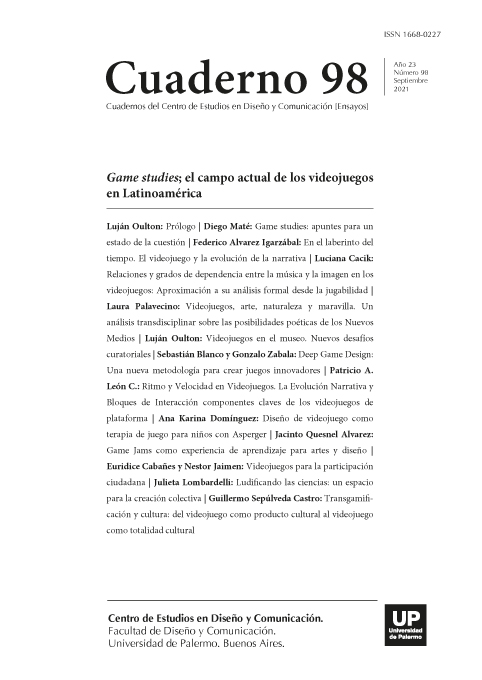Ludificando las ciencias: un espacio para la creación colectiva
Resumen
Este artículo aborda la creación colectiva desde una triple relación: Ludificación, juego y videojuego, en vinculación con las ciencias, particularmente, con la Ciencia Ciudadana. El término Ciencia Ciudadana responde a la elaboración de estudios científicos que realizan ciudadanos no especializados, en colaboración con científicos o instituciones científicas. Existen numerosos ejemplos de proyectos de investigación en Ciencia Ciudadana que han sido ludificados o han desarrollado videojuegos completos. Desde este enfoque, los videojuegos y la Ludificación se manifiestan como un engranaje para incorporar nuevos saberes, pero también, para crear y desarrollar investigaciones colectivas.
Citas
Aarseth, E. (2011). “Define Real, Moron!”-Some Remarks on Game Ontologies. En Digarec Keynote-lectures 2009/10 (pp. 50-68). Universität Potsdam.
Argüello Ospina, C. (2010). El juego como práctica de la libertad: La imposición y la construcción de reglas. Voces y silencios. Revista Latinoamericana de Educación, 1(2), 141-157.
Arza, V., Fressoli, M., Arancibia, F., Arancio, J., del Castillo, M., López, E., … Vasen, F. (2016). Proyecto: Ciencia abierta en Argentina: experiencias actuales y propuestas para impulsar procesos de apertura.
Bally, G., & Reuter, J. (1958). El juego como expresión de libertad. Fondo de Cultura Económica.
Bonney, R., Ballard, H., Jordan, R., McCallie, E., Phillips, T., Shirk, J., & Wilderman, C. C. (2009). Public Participation in Scientific Research: Defining the Field and Assessing Its Potential for Informal Science Education. A CAISE Inquiry Group Report. Online Submission.
Bowser, A., Hansen, D., He, Y., Boston, C., Reid, M., Gunnell, L., & Preece, J. (2013). Using Gamification to Inspire New Citizen Science Volunteers. En Proceedings of the First International Conference on Gameful Design, Research, and Applications (pp. 18–25). New York, NY, USA: ACM. https://doi.org/10.1145/2583008.2583011
Competition - igem.org. (s. f.). Recuperado 20 de diciembre de 2018, de http://igem.org/
Competition Deterding, S., Dixon, D., Khaled, R., & Nacke, L. (2011). From Game Design Elements to Gamefulness: Defining «Gamification». En Proceedings of the 15th International Academic MindTrek Conference: Envisioning Future Media Environments (pp. 9–15). New York, NY, USA: ACM. https://doi.org/10.1145/2181037.2181040
Djaouti, D., Alvarez, J., Jessel, J.-P., & Rampnoux, O. (2011). Origins of serious games. En Serious games and edutainment applications (pp. 25-43). Springer.
Early history of video games. (2018). En Wikipedia. Recuperado de https://en.wikipedia.org/w/index.php?title=Early_history_of_video_games&oldid=873745916
Eveleigh, A., Jennett, C., Lynn, S., & Cox, A. L. (2013). “I Want to Be a Captain! I Want to Be a Captain!”: Gamification in the Old Weather Citizen Science Project. En Proceedings of the First International Conference on Gameful Design, Research, and Applications (pp. 79–82). New York, NY, USA: ACM. https://doi.org/10.1145/2583008.2583019
Games, S. : C. S. (s. f.). Quantum Moves | ScienceAtHome. Recuperado 30 de diciembre de 2018, de https://www.scienceathome.org/games/quantum-moves/
Huizinga, J. (2000). Homo ludens. Alianza. Recuperado de https://books.google.com.ar/ books?id=QQ_OwAEACAAJ
Iacovides, I., Jennett, C., Cornish-Trestrail, C., & Cox, A. L. (2013). Do Games Attract or Sustain Engagement in Citizen Science?: A Study of Volunteer Motivations. En CHI ’13 Extended Abstracts on Human Factors in Computing Systems (pp. 1101–1106). New York, NY, USA: ACM. https://doi.org/10.1145/2468356.2468553
Ihde, D. (2015). Postfenomenología y tecnociencia: conferencias en la universidad de Pekin. Sello Arsgames. In Quantum Gaming, Humans Reign Victorious Over Computers. (2016, abril 13). Recuperado 30 de diciembre de 2018, de https://www.insidescience.org/news/quantum-gaminghumans-reign-victorious-over-computers
Jennett, C., Kloetzer, L., Cox, A. L., Schneider, D., Collins, E., Fritz, M., …
Charalampidis, I. (2017). Creativity in Citizen Cyberscience. Human Computation, 3(1), 181-204.
Juul, J. (2008). The magic circle and the puzzle piece. Kapp, K. M. (2012). The Gamification of Learning and Instruction: Game-based Methods and Strategies for Training and Education.
John Wiley & Sons. Karhulahti, V.-M. (2012). Double fine adventure and the double hermeneutic videogame. En Proceedings of the 4th International Conference on Fun and Games (pp. 19-26). ACM.
Landers, R. N., Auer, E. M., Collmus, A. B., & Armstrong, M. B. (2018). Gamification science, its history and future: Definitions and a research agenda. Simulation & Gaming, 1046878118774385.
Michael, D. R., & Chen, S. L. (2005). Serious games: Games that educate, train, and inform. Muska & Lipman/Premier-Trade. Old Weather. (s. f.). Recuperado 21 de diciembre de 2018, de https://www.oldweather.org/ Play | EyeWire. (s. f.). Recuperado 27 de febrero de 2019, de https://eyewire.org/ RAE. (2015, junio 10). @jc_saap #RAEconsultas Resulta preferible en español el uso de «ludificación», voz formada con la raíz latina «ludus» «juego»,... [Tweet]. Recuperado 19 de abril de 2018, de https://twitter.com/raeinforma/status/608553545403629568?lang=es
Sørensen, J. J. W., Pedersen, M. K., Munch, M., Haikka, P., Jensen, J. H., Planke, T., Lieberoth, A. (2016). Exploring the quantum speed limit with computer games. Nature, 532(7598), 210.
Sternberg, R. J. (2006). The Nature of Creativity. Creativity Research Journal, 18(1), 87-98. https://doi.org/10.1207/s15326934crj1801_10
Tinati, R., Luczak-Roesch, M., Simperl, E., & Hall, W. (2017). An investigation of player motivations in Eyewire, a gamified citizen science project. Computers in Human Behavior, 73, 527-540. https://doi.org/10.1016/j.chb.2016.12.074
Los autores/as que publiquen en esta revista ceden los derechos de autor y de publicación a "Cuadernos del Centro de Estudios de Diseño y Comunicación", Aceptando el registro de su trabajo bajo una licencia de atribución de Creative Commons, que permite a terceros utilizar lo publicado siempre que de el crédito pertinente a los autores y a esta revista.


